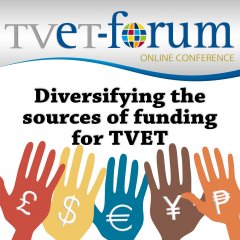
The UNESCO-UNEVOC International Centre: Who We Are | What We Do | Working With Us | Get in Touch
The UNEVOC Network: Learn About the Network | UNEVOC Network Directory
For Members: UNEVOC Centre Dashboard
Thematic Areas: Inclusion and Youth | Digital Transformation | Private Sector Engagement | SDGs and Greening TVET
Our Key Programmes & Projects: BILT: Bridging Innovation and Learning in TVET | Building TVET resilience | TVET Leadership Programme | WYSD: World Youth Skills Day
Past Activities: COVID-19 response | i-hubs project | TVET Global Forums | Virtual Conferences | YEM Knowledge Portal
Our Services & Resources: Publications | TVET Forum | TVET Country Profiles | TVETipedia Glossary | Innovative and Promising Practices | Toolkits for TVET Providers | Entrepreneurial Learning Guide
Events: Major TVET Events | UNEVOC Network News
 In this UNESCO-UNEVOC virtual conference, we discussed diversifying sources of funding for TVET. The conference took place from 16 to 22 January 2017 on the UNESCO-UNEVOC TVeT Forum.
In this UNESCO-UNEVOC virtual conference, we discussed diversifying sources of funding for TVET. The conference took place from 16 to 22 January 2017 on the UNESCO-UNEVOC TVeT Forum.
Technical and vocational education and training (TVET) is considered a powerful tool to prepare youth for the labour market and provide lifelong learning opportunities to adults. It plays a strategic role in the achievement of the 2030 Agenda for Sustainable Development.
In particular, Sustainable Development Goal 4 on Education![]() calls on Members States to “ensure inclusive and quality education for all and promote lifelong learning”. It notably targets, among other things, “equal access for all women and men to affordable and quality technical, vocational and tertiary education, including university” (SDG 4.3) and a “substantial increase in the number of youth and adults who have relevant skills, including technical and vocational skills, for employment, decent jobs and entrepreneurship” (SDG 4.4).
calls on Members States to “ensure inclusive and quality education for all and promote lifelong learning”. It notably targets, among other things, “equal access for all women and men to affordable and quality technical, vocational and tertiary education, including university” (SDG 4.3) and a “substantial increase in the number of youth and adults who have relevant skills, including technical and vocational skills, for employment, decent jobs and entrepreneurship” (SDG 4.4).
This vision of TVET supports the transition towards inclusive and sustainable societies and economies, but also requires TVET systems to transform and adapt to remain relevant.
Various strategies have been adopted to increase funding in TVET, including output-based funding approaches. Other strategies focus on mobilizing other stakeholders. One such stakeholder is industry by implementing apprenticeship or alternance-based training, as well as introducing training or apprenticeship taxes and levies.
Given the importance of finance in TVET today, and trends in diversifying the sources of funding for TVET, this virtual conference addressed the following questions:
The virtual conference also took into account the outcomes of our previous virtual conference on 'Measuring the Return on Investment' (2016).
 Christine Uhder
Christine Uhder
Christine Uhder is a Project Manager at the GRET and specializes in vocational training, professional integration and business development services to SMEs. Christine has 8 years-experience as an international consultant and project manager in Sub-Saharan Africa and South-East Asia regions. Through her work, she ensures the design, implementation and monitoring of large scale development projects and conducts research on the topic of financing TVET in Sub-Saharan Africa, South-East Asia and Latin America, with the aim to analyze and compare strategies implemented to ensure a cost-efficient use of resources, mobilize the private sector in funding TVET, and design financing systems that support lifelong learning and sustainable societies.